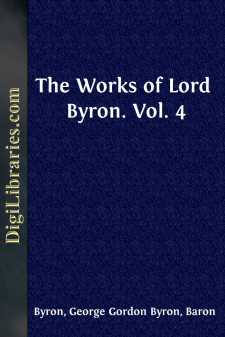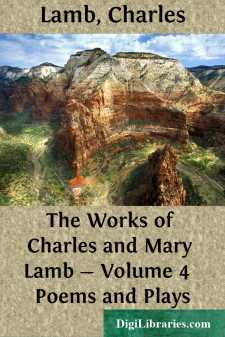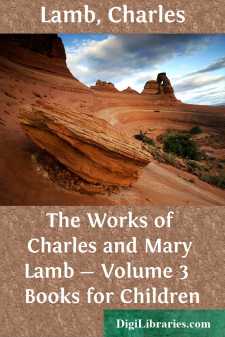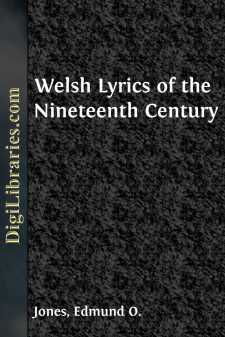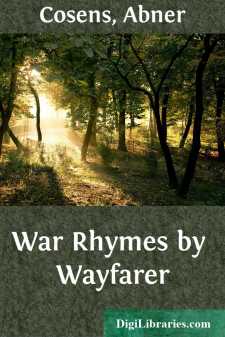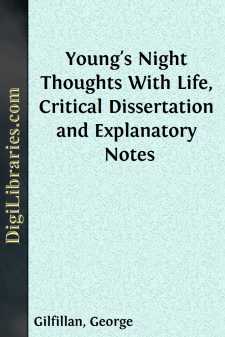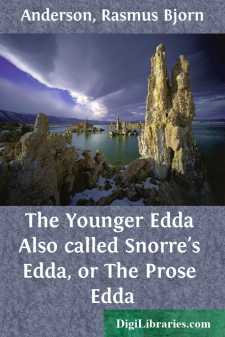Poetry Books
Sort by:
The source code for this HTML page contains only Latin-1 characters, but it directs the browser to display some special characters. The original work contained a few phrases or lines of Greek text. These are represented here as Greek letters, for example Οá¿âμοι. If the mouse is held still over such phrases, a transliteration in Beta-code pops up. Aside from Greek letters, the only...
more...
by:
Charles Lamb
INTRODUCTION The earliest poem in this volume bears the date 1794, when Lamb was nineteen, the latest 1834, the year of his death; so that it covers an even longer period of his life than Vol. I.—the "Miscellaneous Prose." The chronological order which was strictly observed in that volume has been only partly observed in the following pages—since it seemed better to keep the plays together...
more...
by:
Charles Lamb
THE TEMPEST (By Mary Lamb) There was a certain island in the sea, the only inhabitants of which were an old man, whose name was Prospero, and his daughter Miranda, a very beautiful young lady. She came to this island so young, that she had no memory of having seen any other human face than her father's. They lived in a cave or cell, made out of a rock: it was divided into several apartments, one...
more...
A Dream.I stood far off above the haunts of menSomewhere, I know not, when the sky was dimFrom some worn glory, and the morning hymnOf the gay oriole echoed from the glen.Wandering, I felt earth's peace, nor knew I soughtA visioned face, a voice the wind had caught.I passed the waking things that stirred and gazed,Thought-bound, and heeded not; the waking flowersDrank in the morning mist,...
more...
by:
Edmund O. Jones
ALUN. John Blackwell (Alun), was born of very poor parents at Mold in 1797. Beginning life as a shoe-maker, his successes at the Eisteddfods of Ruthin and Mold in 1823 attracted the attention of the gentry of the neighbourhood, and a fund was formed to send him to the University. He took his degree from Jesus College, Oxford, in 1828, and died rector of Manordeifi 1840. His works were published...
more...
by:
Abner Cosens
FOREWORD The reader of this booklet is not expected to agree with everything in it. The rhymes express only the impressions made on the writer at the time by the varied incidents and conditions arising out of the great war, and some of them did not apply when circumstances changed. They have been printed as written, however, and, if they serve no other purpose, may at least help us to recall some...
more...
ANONYMOUS.1.Madrigal.Love not me for comely grace,For my pleasing eye or face;Nor for any outward part,No, nor for my constant heart:For those may fail or turn to ill,So thou and I shall sever:Keep therefore a true woman's eye,And love me still, but know not why;So hast thou the same reason stillTo doat upon me ever. 2.The Forsaken Merman.Come, dear children, let us away;Down and away below.Now my...
more...
by:
George Gilfillan
ON THE LIFE AND POETIC GENIUS OF EDWARD YOUNG. Between the period of George Herbert, and that of Edward Young, some singular changes had taken place in British poetry as well as in British manners, politics, and religion. There had passed over the land the thunderstorm of the Puritanic Revolt, which had first clouded and then cleared, for a season, the intellectual and moral horizon. The effect of this...
more...
PREFACE. In the beginning, before the heaven and the earth and the sea were created, the great abyss Ginungagap was without form and void, and the spirit of Fimbultyr moved upon the face of the deep, until the ice-cold rivers, the Elivogs, flowing from Niflheim, came in contact with the dazzling flames from Muspelheim. This was before Chaos. And Fimbultyr said: Let the melted drops of vapor quicken...
more...
by:
John Hartley
Poetry. Bite Bigger. As aw hurried throo th' taan to mi wark,(Aw wur lat, for all th' whistles had gooan,)Aw happen'd to hear a remark,'At ud fotch tears throo th' heart ov a stooan—It wur raanin, an' snawin, and cowd,An' th' flagstoans wur covered wi' muck,An' th' east wind booath whistled an' howl'd,It saanded like nowt but ill...
more...


